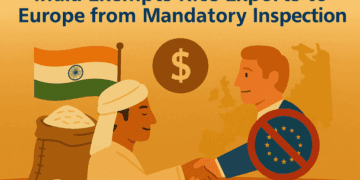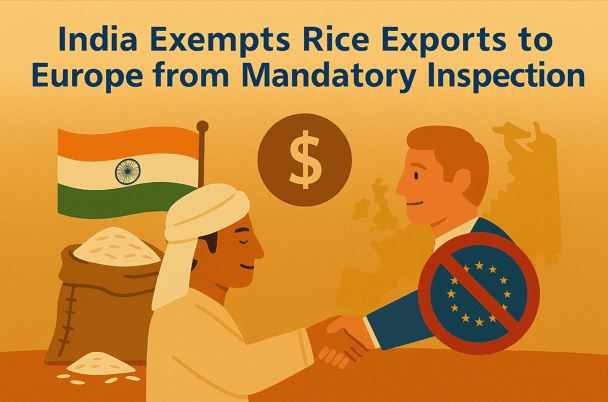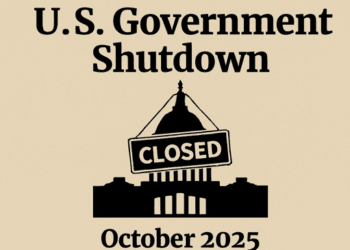India Exempts Rice Exports
In a significant policy shift aimed at boosting agricultural exports, the Directorate General of Foreign Trade (DGFT) has announced a temporary exemption for rice exports to select European countries from mandatory inspection requirements. Effective from October 3, 2025, this move is expected to streamline export procedures, reduce compliance burdens, and enhance India’s competitiveness in global rice markets.
Policy Overview
According to DGFT Notification No. 39/2025-26, the requirement for a Certificate of Inspection (COI) issued by the Export Inspection Council (EIC) or Export Inspection Agency (EIA) has been waived for rice exports to certain European destinations. The exemption applies to both Basmati and Non-Basmati rice under HSN 1006, and will remain in effect until April 2, 2026.
Countries Covered Under Exemption
- Austria
- Belgium
- Denmark
- Finland
- Portugal
- Spain
- Others not listed under mandatory COI requirement
However, exports to EU Member States, the United Kingdom, Iceland, Liechtenstein, Norway, and Switzerland will still require a COI from EIC/EIA.
Impact on Exporters
This exemption is expected to benefit thousands of Indian rice exporters, particularly small and medium enterprises (SMEs) that often struggle with inspection delays and certification costs. By removing the COI requirement for select European markets, exporters can expedite shipments and reduce overheads.
Key Benefits
- Faster turnaround time for shipments
- Lower compliance costs
- Improved access to mid-tier European markets
- Enhanced competitiveness against regional exporters
Industry Reactions
Exporters and trade associations have welcomed the move. The All India Rice Exporters Association (AIREA) called it a “timely and pragmatic decision” that aligns with India’s goal of expanding agri-exports. Traders in Punjab, Haryana, and Andhra Pradesh have already reported increased inquiries from European buyers.
Quotes from Stakeholders
- “This exemption will help us meet delivery timelines and reduce paperwork.” – Rajesh Mehta, rice exporter from Karnal
- “We expect a 15–20% rise in orders from Spain and Portugal.” – Anjali Rao, logistics manager, Vishakhapatnam
- “It’s a win for exporters and a step toward ease of doing business.” – AIREA spokesperson
Trade Data and Projections
India exported over $9.6 billion worth of rice in FY 2024–25, with Europe accounting for approximately 12% of total shipments. With the new exemption, analysts expect exports to non-EU European countries to grow by 20–25% over the next six months.
| Region | FY 2024–25 Export Value (USD) | Projected Growth (Oct 2025–Apr 2026) |
|---|---|---|
| EU + UK + EFTA | $1.1 billion | Stable |
| Non-EU Europe | $320 million | +25% |
| Middle East | $3.4 billion | +5% |
| Asia-Pacific | $2.8 billion | +8% |
Compliance and Documentation
While the COI requirement is waived for certain destinations, exporters must still comply with other documentation protocols, including phytosanitary certificates, customs declarations, and traceability records. DGFT has advised exporters to maintain quality standards and ensure transparency in labeling.
Mandatory Documents Still Required
- Phytosanitary Certificate
- Bill of Lading
- Commercial Invoice
- Packing List
- Certificate of Origin (where applicable)
Strategic Implications
This policy shift aligns with India’s broader strategy to diversify export markets and reduce dependency on traditional buyers. It also reflects a push toward regulatory simplification and trade facilitation under the Foreign Trade Policy 2023–28.
Policy Objectives
- Boost agri-export volumes
- Enhance ease of doing business
- Strengthen trade ties with Europe
- Support MSMEs in global trade
Challenges and Risks
While the exemption is beneficial, it also raises concerns about quality assurance and food safety. European buyers may demand third-party audits or private certifications. Exporters must remain vigilant to avoid reputational risks or shipment rejections.
Potential Risks
- Increased scrutiny from European importers
- Risk of non-compliance with EU food safety norms
- Possibility of policy reversal post-April 2026
- Need for robust traceability systems
Conclusion
The DGFT’s decision to exempt rice exports to select European countries from mandatory inspection marks a progressive step in India’s trade policy. It offers exporters a window of opportunity to expand market share, reduce costs, and build new partnerships. However, maintaining quality and compliance will be key to sustaining this momentum.
Postscript: What to Watch Next
Exporters should monitor DGFT updates, buyer feedback, and EU regulatory developments. The exemption is temporary, and its renewal or expansion will depend on trade performance and diplomatic engagement. For now, it’s a green signal for India’s rice trade to Europe.




















